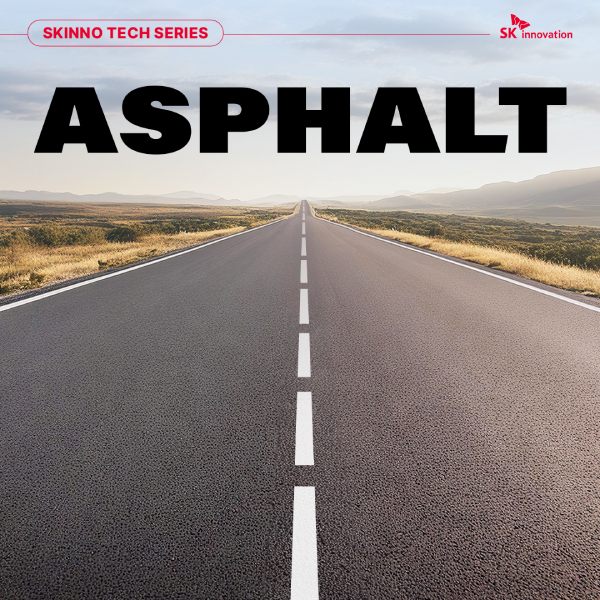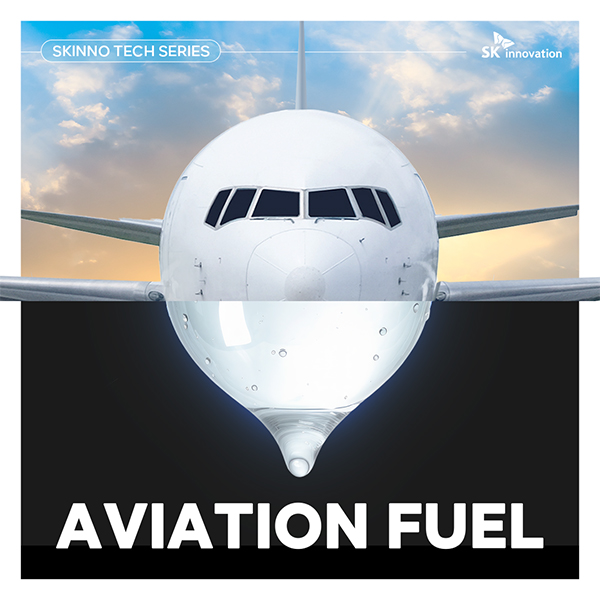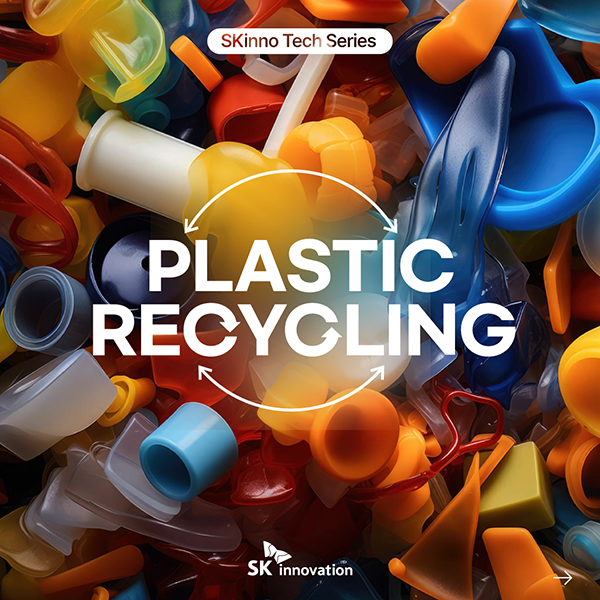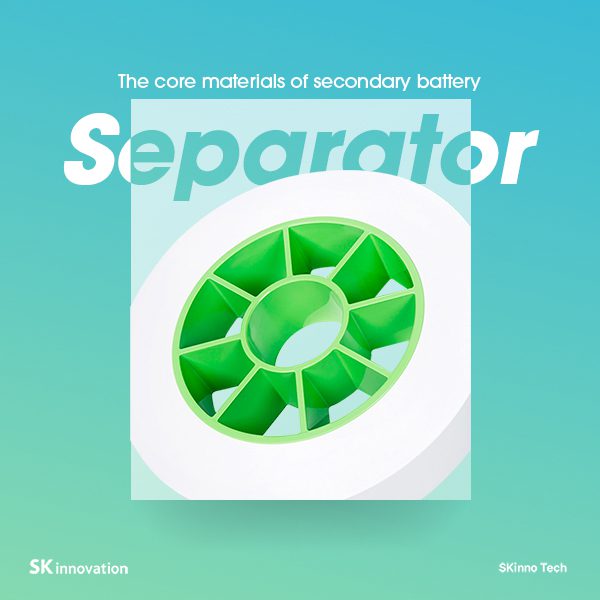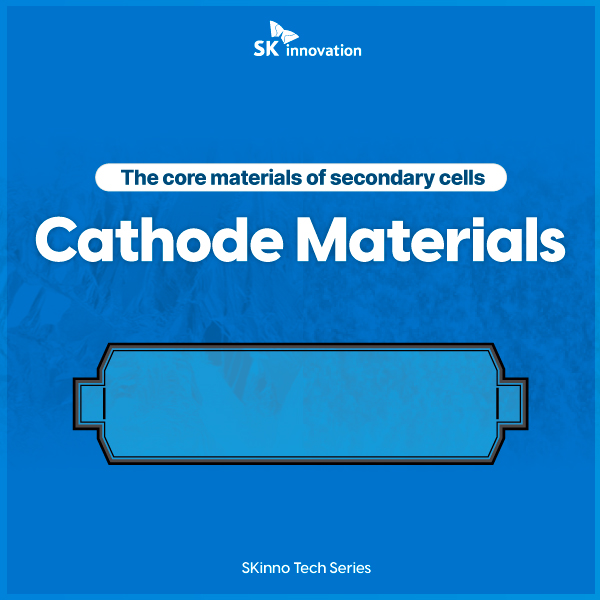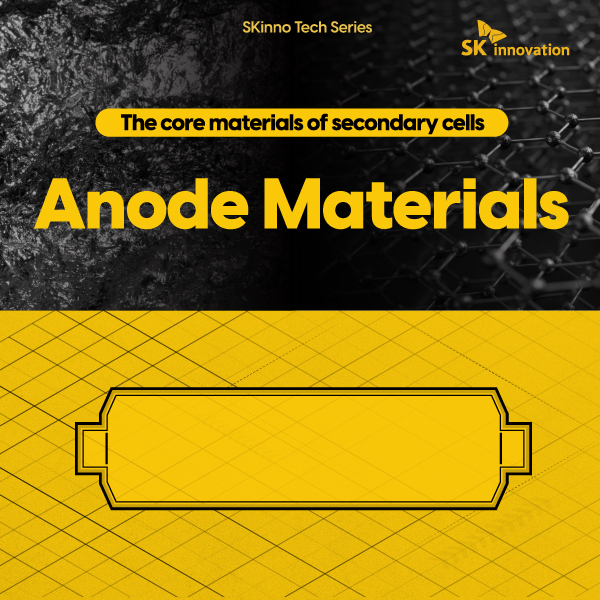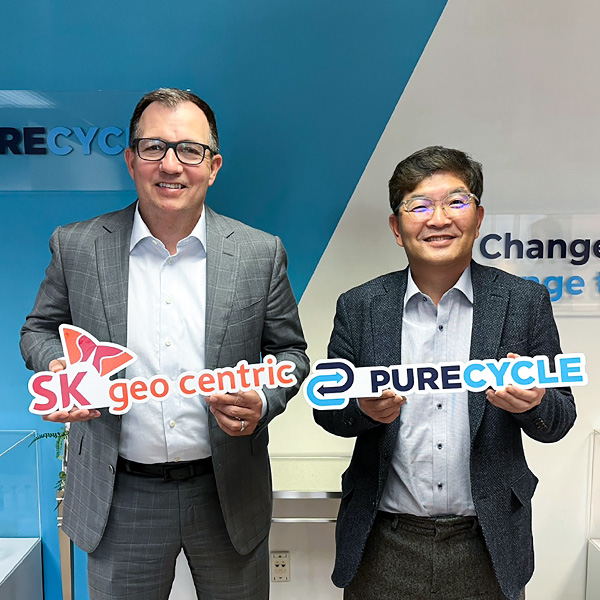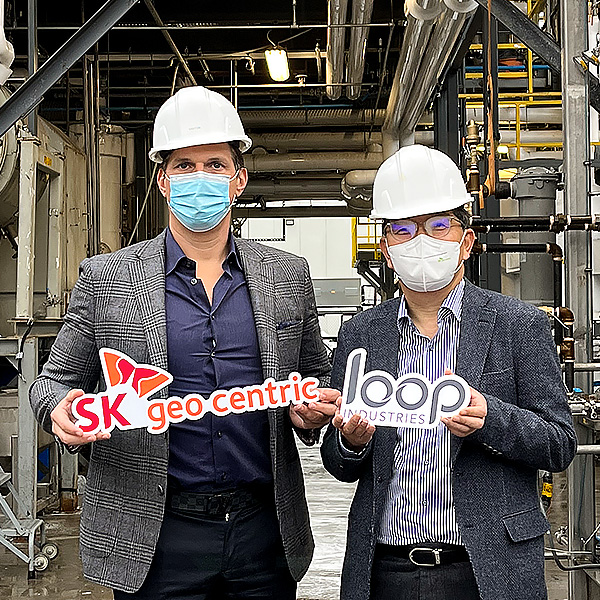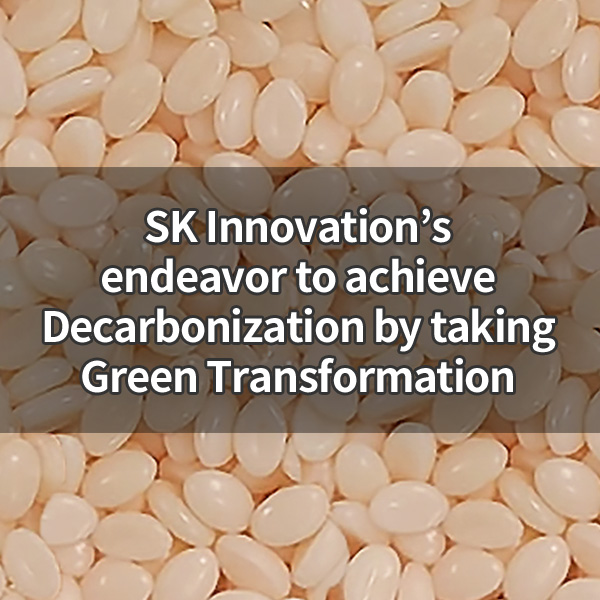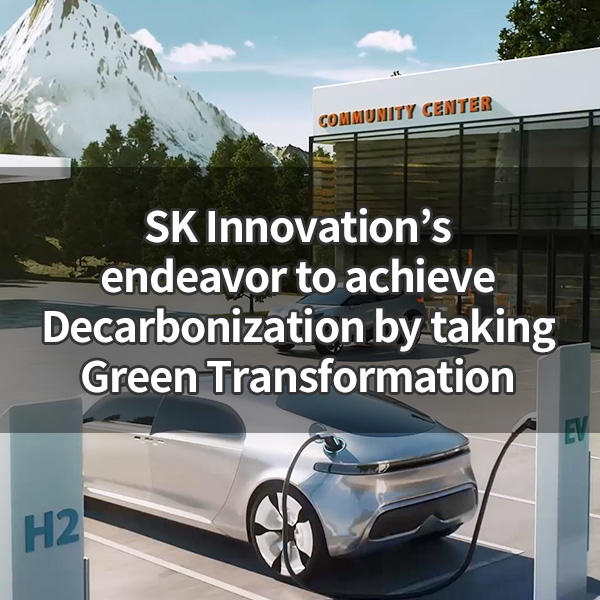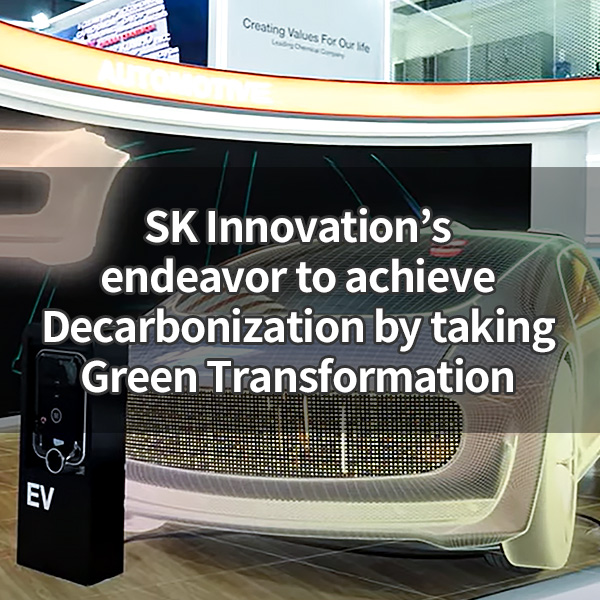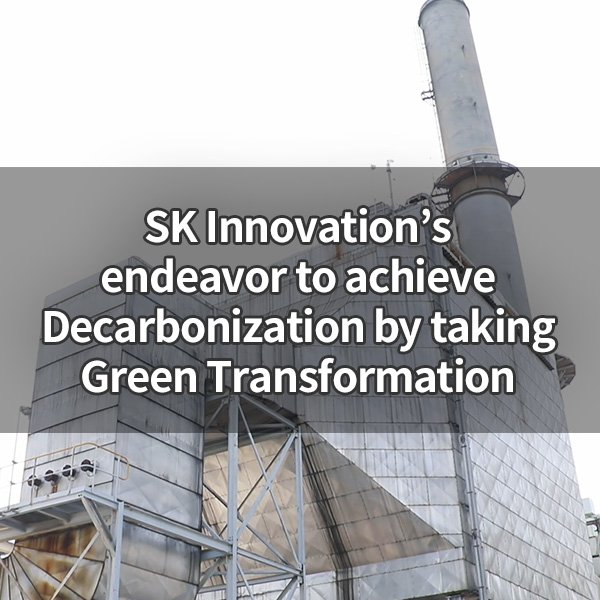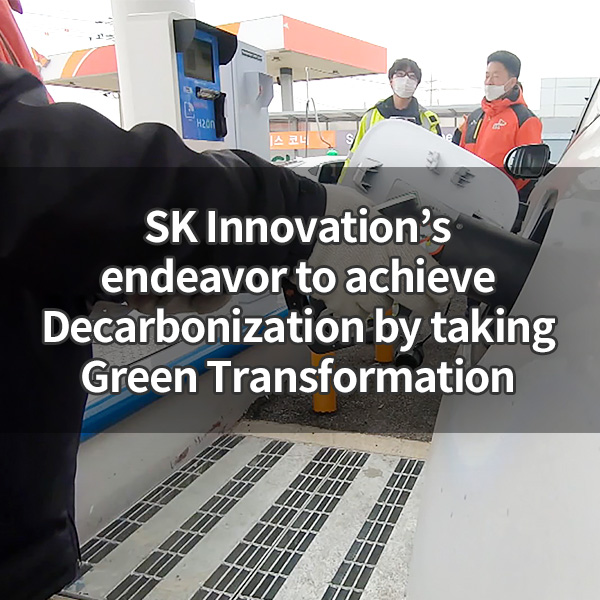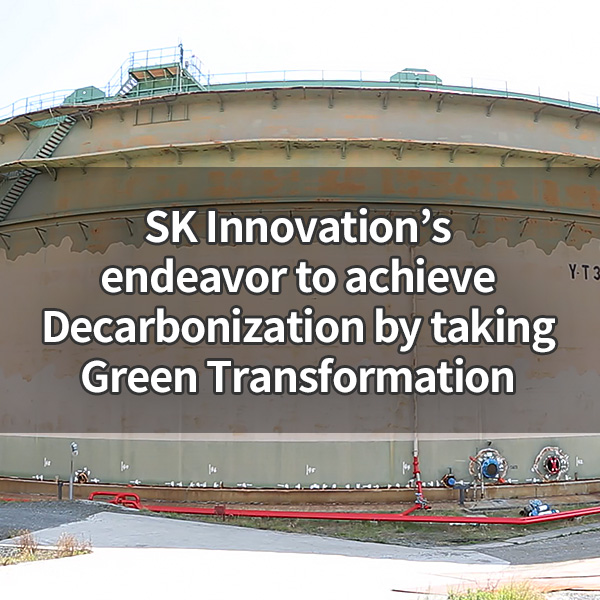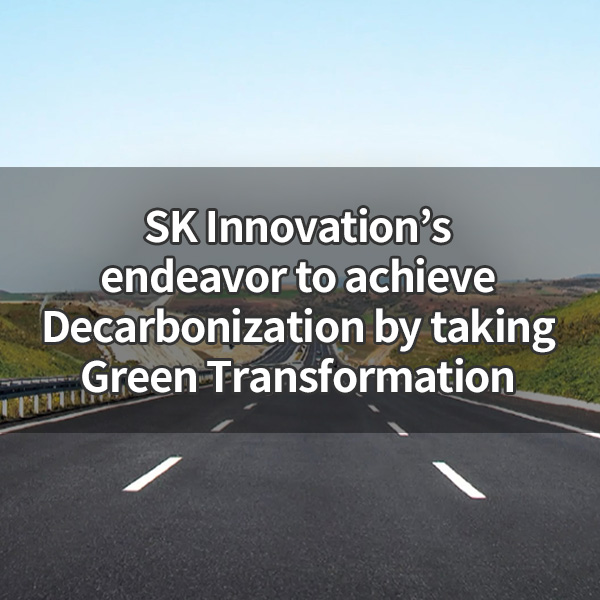2024.09.24
 Series
Series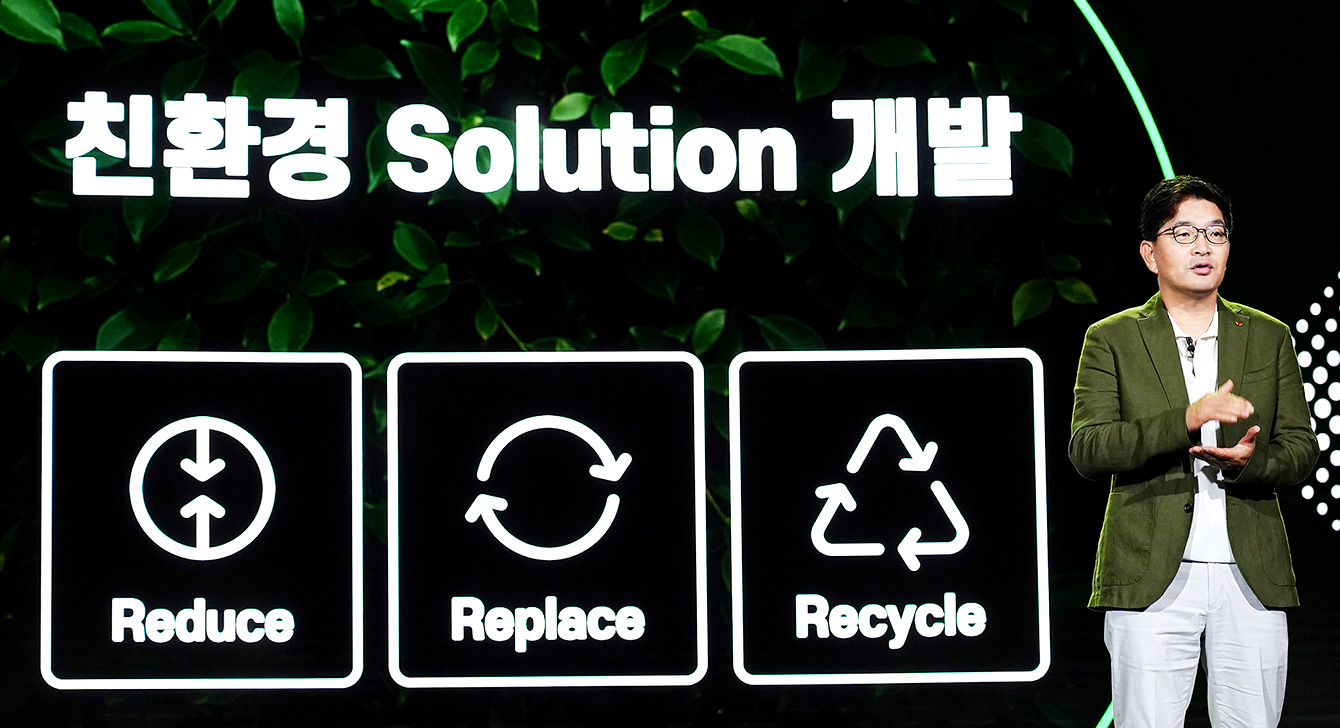
SK Global Chemical is a petrochemical company that started Korea’s first naphtha cracking center (NCC) as the main chemical process. However, in March last year, the company announced that it planned to shut down the NCC and the EPDM (ethylene-propylene diene monomer, a synthetic rubber) production in SK Innovation Ulsan Complex (“Ulsan CLX”). Soon after the announcement, SK Global Chemical stopped operating the 35,000-ton EPDM process that was produced by receiving raw materials from the NCC plant in May 2020, followed by the shutdown of NCC production in December.
As such, SK Global Chemical is attempting to make deep changes to move away from its focus on the competitive naphtha cracking market to increase the ratio of high-end chemical materials. As reported earlier, at the Story Day event held on July 1st, the company has declared its full-scale transition of “Carbon to Green.”
Through this series, let’s review how SK Global Chemical is transforming into a global green chemical company, including its efforts towards eco-plastic production and plastic recycling technology development.
| Code number project teams in full charge of SK Global Chemical’s plastic waste recycling
Earlier this year, SK Global Chemical launched the Green Business Group in a bid to complete a circular economy model that recycles 100% of the plastics it produces. Based on the idea of the plastic classification codes, the Green Business Group is creating a code for each plastic material and dividing plastic waste into the codes. The group set up a project squad for each code number to be in charge of operating the plastic recycling business.
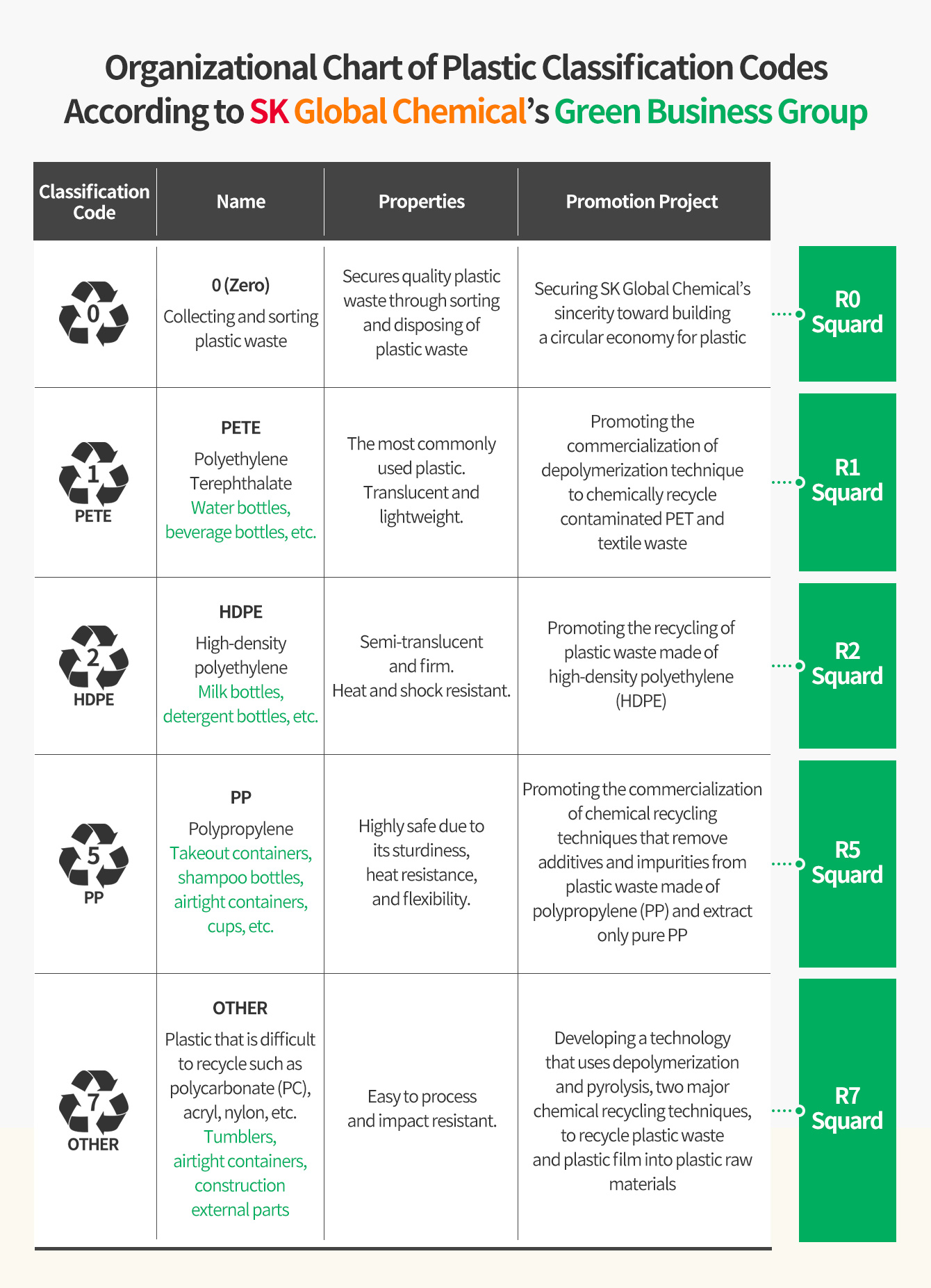
R stands for recycling, and the number following the letter R is the ISO-defined code for the material.
R0 Squad is in charge of collecting and sorting plastic waste. Accurately separating plastic waste to secure quality plastic is the first yet the most challenging step in plastic recycling. SK Global Chemical’s genuine interest in creating a system for recirculating plastic starts with R0 Squad.
The number 1 in R1 Squad is for polyethylene terephthalate (PETE). It is the common material used to make plastic water bottles and beverage bottles. Currently, upcycling clean PET into clothing, shoes, and bags is one of the most actively done recycling activities. R1 Squad is going beyond this to commercialize the depolymerization technology for chemical recycling of contaminated PET and textile waste.
R2 Squad is in charge of high-density polyethylene (HDPE) plastic recycling and R5, polypropylene (PP) plastic recycling. They are working on commercializing chemical recycling technologies that eliminates additives and foreign substances to extracts only pure PP from plastics used in contaminated or colored containers, shampoo bottles, and car interior parts.
The number 7 in R7 Squad is for other types of plastic. This category includes plastic types that are difficult to be recycled such as polycarbonate (PC), acrylic plastic, and nylon. R7 Squad focuses on using major chemical recycling techniques, depolymerization, and pyrolysis to recycle waste plastic and vinyl into plastic raw materials.
In addition, there is the B1 Squad, which is not a part of the plastic classifications. B stands for bio, and the squad is carrying out its mission to produce eco-friendly, easily decomposing biodegradable plastics that can be applied to agricultural films.
SK Global Chemical’s implementation of this plastic waste classification project aims at correct ways of recycling plastic waste. This also demonstrates the company’s strong will to solve the environmental pollution problem and to go green.
| SK Global Chemical’s efforts to create a sustainable circular economy for plastic
Implementation of ESG strategies now has become mandatory for companies, and SK Global Chemical is collaborating with various public, private, and academic organizations to offer green solutions, taking the lead in establishing an eco-friendly circular economy for plastics with stakeholders in the value chain.
To resolve various plastic-related issues, SK Global Chemical enforces the 3R sustainability strategy – Recycle, Replace, and Reduce. The 3R strategy includes using physical and chemical recycling techniques to solve plastic pollution and combining the two techniques to introduce a new solution, replacing conventional chemical materials with eco-friendly materials, and using less plastic in packaging, and developing light-weight materials for car interior parts to reduce the volume of materials used by improving the material properties.
Based on this 3R strategy, SK Global Chemical offers various eco-friendly solutions, producing products made of recycled plastics and joining networks with clients that need highly functional yet eco-friendly materials.
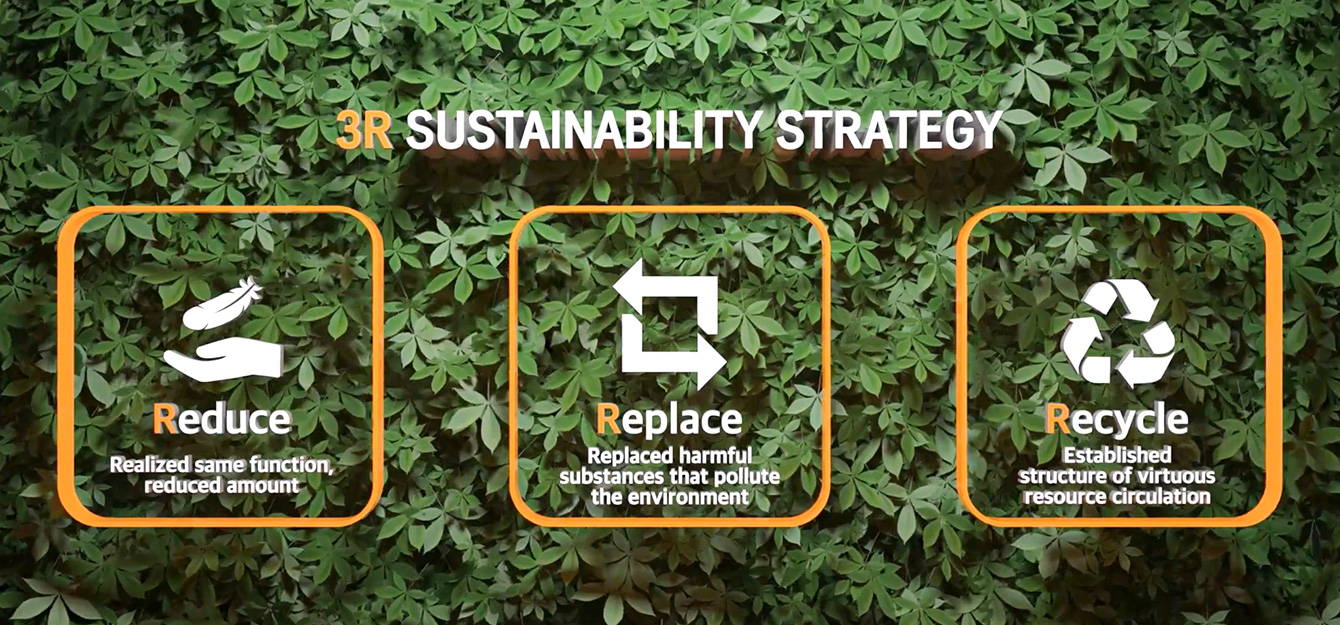
▲ SK Global Chemical’s 3R strategy
With the household goods brand Clean Wrap, SK Global Chemical jointly developed the PE wrap that can replace PVC (polyvinyl chloride). PVC is classified as general waste because it is impossible to recycle due to problems such as reduced strength when mixed with other synthetic resins and generating harmful chemicals when incinerated. On the other hand, PE wrap is harmless to the human body and recyclable, and it boasts excellent elasticity, which allows for easy packaging. In addition, it does not generate any harmful substances when incinerated, and it can be recycled without having to be separated from the synthetic resin.
In addition, SK Global Chemical is working with Dongmin Industry Cooperative to turn discarded agricultural silage into upcycled fabric, and starting this July, the company is using this fabric to make eco-friendly sacks for SK Global Chemical’s high-performance polyethylene material Nexlene* as well as various other upcycling products. Moreover, it has developed eco-friendly packaging materials made of a single material such as polyethylene (PE) for easy recycling and is supplying them to online and offline distribution businesses such as Market Kurly. The company also applied PCR**, a recycled plastic, to the SK ZIC container of SK Lubricants, a subsidiary of SK Innovation’s lubricant business, and transformed it into an eco-friendly container.
(*)Nexlene™: Korea’s first high-performance polyethylene developed by SK Global Chemical in late 2010, made with 100% original technology for the entire process of catalyst, process, and product production
(**)PCR (Post-consumer recycled): Recycled plastic from waste that has passed through the normal distribution process

▲ (Left) SK Global Chemical’s waste silage upcycling process / (Right) SK Lubricants’ SK ZIC ZERO engine oil using eco-friendly containers
In May this year, SK Global Chemical, Maeil Dairies, Tetra Pak Korea, and Jushin Trading signed an MOU to be the first in Korea to promote aseptic cartons recycling by extracting plastics and aluminum composite materials. The paper materials from aseptic carton waste have been recycled and used as kitchen towels; however, the composite materials were only incinerated or landfilled. To solve this problem, the four companies, including SK Global Chemical, will use the composite materials from aseptic cartons to develop recycled plastics for pallets and food and beverage transport boxes, aiming to make them commercial by the end of this year.
Furthermore, SK Global Chemical is collaborating with Kolon Industries to launch the biodegradable plastic product PBAT (polybutylene adipate-co-terephthalate) in the third quarter of this year. The eco-friendly biodegradable plastic product PBAT is known to be able to naturally degrade within six months after being buried and is expected to solve the plastic pollution problem. The company aims to produce more than 50,000 tons of PBAT per year, which is the largest scale in Korea, by 2023 to preemptively respond to the demand for biodegradable products, which is expected to increase in the future.
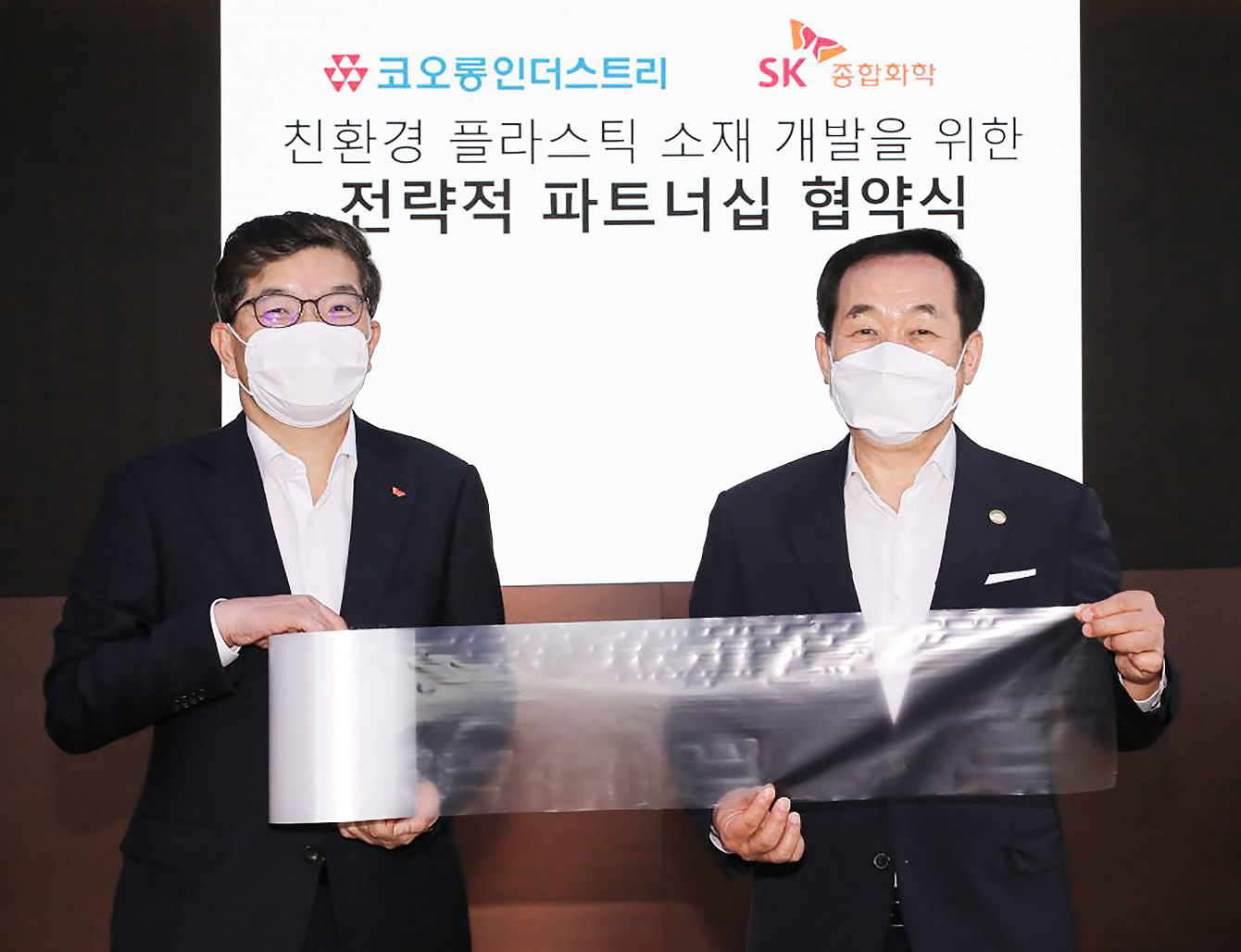
▲ CEO of SK Global Chemical Na Kyung-soo and CEO of Kolon Industries Jang Hee-goo show a sample of PBAT product jointly developed by the two companies after signing a strategic partnership to commercialize eco-friendly biodegradable plastic products at SK Building in Seoul on April 7th, 2021.
In June, SK Global Chemical signed a business agreement with the Korea Smart E-Mobility Association and CEPLA Co., Ltd, which owns advanced plastic material technology, to develop eco-friendly recycled plastic products applied to automobiles and electric/electronic products. With the Korea Smart E-Mobility Association, SK Global Chemical plans to develop new materials for ultra-compact electric vehicles, and in the mid- to long-term, develop light-weight materials for mid- and large-sized electric vehicles. With CEPLA, SK Global Chemical plans to supply eco-friendly materials made from recycled plastic waste. Using this, CEPLA will apply eco-friendly composite materials to automobiles and electric/electronic products and supply them to GM and Samsung Electronics.
Meanwhile, SK Global Chemical is actively listening to environment-related opinions from stakeholders in the value chain. By hosting the Korea Eco-friendly Packaging Forum in November 2019 and 2020, it invited about 60 public, private, and academic institutions, including packaging product manufacturers, societies, and the Ministry of Environment, and established an online-offline communication channel between the stakeholders in the relevant industries to take the lead in creating an eco-friendly ecosystem.
In May, CEO of SK Global Chemical President Na Kyung-soo attended the P4G (Partnering for Green Growth and the Global Goals 2030) Seoul Summit as a representative of the company in the panel discussion of the circular economy session. At the event, CEO Na shared the green business strategies that SK Global Chemical is promoting such as 3R and further suggested measures to solve the global plastic pollution and create an eco-friendly ecosystem for plastics.
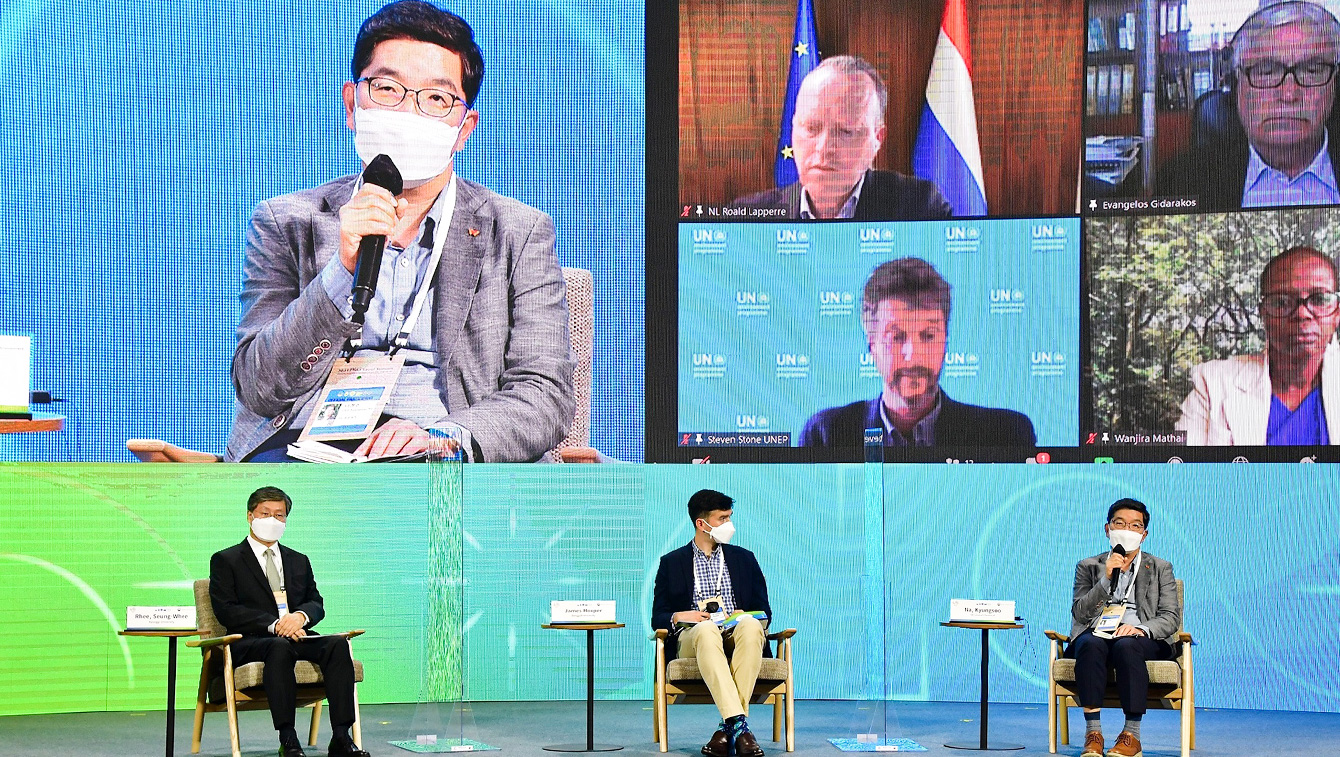
▲ CEO of SK Global Chemical Na Kyung-soo (first from left) participates as a panelist at the Circular Economy Session of the 2021 P4G Seoul Summit
As such, SK Global Chemical is seeking to collaborate with stakeholders in the value chain in each process involved in the industrial ecosystem including the material production, finished goods manufacturing and distribution, and use of plastic products to complete a sustainable circular economy for plastic waste.
In this first episode, we have looked at some of SK Global Chemical’s major moves to become a global green chemical company, leading the new green paradigm by providing products that are useful for both mankind and the environment.
On the other hand, SK Global Chemical is promoting its city oil field project to complete the circular economy for plastics based on its green business. In the next episode, we will find out more about pyrolysis and depolymerization, the major chemical recycling techniques used for the city oil field project.
– SK Global Chemical announces strategic investment in Loop Industries to recycle waste PET plastic and polyester fiber
– SK Global Chemical signs MOU with PureCycle Technologies to recycle PP waste
– CEO of SK Global Chemical proposes plan to recycle 100% plastic products at 2021 P4G Seoul Summit
– SK Global Chemical, Maeil Dairies, Tetra Pak Korea, Jushin Trading signed an MOU to promote aseptic cartons recycling
– Kolon Industries and SK Global Chemical to launch decomposing biodegradable plastic PBAT product in Q3 2021










 Youtube
Youtube Facebook
Facebook Instagram
Instagram Linkedin
Linkedin








